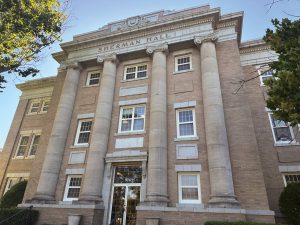
Chemistry professor shares insight
By Laura Veach
Dr. Aaron Harrison, Assistant Professor of Chemistry, says lessons in the classroom are just part of the teaching and learning experience. He and many Austin College faculty members conduct independent research projects that deepen their own understanding, enhance their lessons for students, and expand the knowledge in their field of interest. He shares how this aspect of his career is so fulfilling.
What do you hope to accomplish with your research?
I’ve always been fascinated with the interaction of light with matter, and my research throughout my Ph.D. until now has focused on the field of photochemistry: the absorption of energy, in the form of sunlight, by molecules present in the atmosphere. This is a major source of chemical change in the environment.
My research aims to better understand the underlying mechanisms of sunlight-driven photochemical reactions. Understanding this chemistry is essential for making meaningful models and predictions about the evolution of Earth’s atmosphere.
What does the participation of students add to your projects?
Working with students is an important part of my research and the Austin College experience for chemistry majors in general. Engaging in research allows students to apply what they’ve learned in the classroom to real-world problems. This hands-on experience is invaluable for their academic and professional development. Also from a pure research perspective, students might ask questions or consider aspects of a project that more experienced researchers might not, leading to new research directions or insights.
What is the verification process to have research findings published?
For research publications, the submitted manuscripts will go through a peer review process where the draft will be sent to reviewers in the field to anonymously review the work. The editor will then compile those comments and ask me to respond to them before a decision is made about acceptance for publication. I also write for online publications like The Conversation where I have an editor, but drafts of the article do not undergo any kind of external peer/expert review.
Faculty Research Adds Depth and Breadth
Austin College faculty members’ research projects and fine arts performances allow them to pursue specific interests, enhance current classroom offerings for students, and contribute to the body of knowledge in their areas of expertise. The following list reflects publications and performances reported between October 2022 and April 2023.
Empowering Students as Change Agents in Psychology Classes.
Edited by M. Fortner and I. Katzarska-Miller
Society for the Teaching of Psychology
“Same Rhetoric, Different Decade: Recognizing the Times, Calculated Action, and Other Sources of Empowerment”
Dr. Nate Bigelow, Professor of Political Science
Dr. Lisa M. Brown, Dean of Social Sciences
Dr. Danielle Franks, Adjunct Assistant Professor of Psychology
Dr. Felix Harcourt, Associate Professor of History
Dr. Sandy Philipose ’99, Professor of Education
Dr. Claire Wolnisty, Associate Professor of History
Vivomatografías: Revista de Estudios Sobre Precine y Cine Silente en Latinoamérica
“Un Vagabundo Revolucionario y Antimaterialista: Charlot en Don Quijote de Hollywood de Luis Felipe Rodríguez (Cuba, 1936)”
Dr. Patrick Duffey, Professor of Spanish
ACS Earth and Space Chemistry
“Reaction of Glyoxal and Ammonium as a Potential Contributor to Protein-Like Fluorescence in Atmospheric Measurements”
International Journal of Chemical Kinetics
“Temperature-Dependent Kinetics of the Reactions of CH200 with Acetone, Biacetyl, and Acetylacetone”
Earth and Space Science
“Chromophoric Dissolved Organic Matter (CDOM) Across an Elevational Gradient from Sea Level to Mountain Lakes”
Dr. Aaron Harrison, Assistant Professor of Chemistry
Hume Studies 47
“Hume and the Royal African”
Dr. Max Grober, Professor of History
Cancer Med
“Adjuvant Chemotherapy Non-Adherence, Patient-Centered Communication, and PatientLevel Factors in Elderly Breast and Colon Cancer Patients”
Dr. Kerri-Anne Mitchell, Assistant Professor of Public Health
Academy of American Poets’ Poem-a-Day
“The Tejano Considers Seeds”
Dr. Sebastián Páramo, Visiting Assistant Professor of English
Bowed Colors
Performed by Peter Sulski and Randall Hodgkinson
“Capriciously Strung”
Dr. John McGinn. Associate Professor of Music
The American Economist
“Examining the Association Between Financial Education and Financial Risk Tolerance”
Dr. Ashley Tharayil ’10, Associate Professor of Economics
Histories of Tibet: Essays in Honor of Leonard W.J. van der Kuijp
Edited by J. Liang, K. Schaeffer, and B. McGraff
“No Stone Unturned: Un-Disciplining Tibetan Buddhist Studies”
Dr. Ivette Vargas-O’Bryan, Professor of Religious Studies
History from Loss
Edited by D. Woolf and M. Hughes-Warrington
“Edward A. Pollard, 1832-1872”
Dr. Claire Wolnisty, Associate Professor of History
CREATE: Expanding Student Enrichment Opportunities
By Laura Veach
 When Dr. Renee Countryman was named Richardson Chair for the Center for Research, Experiential, Artistic, & Transformative Education (CREATE) in 2021, her goal was to make the most of the program’s resources. She focused on providing off-campus learning opportunities to as many students as possible. “We exist to fund students, and I just say ‘yes,’ and then I have a committee of people who vote and say ‘yes,’—because we just want to say ‘yes,’” she said.
When Dr. Renee Countryman was named Richardson Chair for the Center for Research, Experiential, Artistic, & Transformative Education (CREATE) in 2021, her goal was to make the most of the program’s resources. She focused on providing off-campus learning opportunities to as many students as possible. “We exist to fund students, and I just say ‘yes,’ and then I have a committee of people who vote and say ‘yes,’—because we just want to say ‘yes,’” she said.
CREATE is the home for undergraduate research at Austin College. Students, either individually or as a group, identify a subject they would like to research, then team with a mentoring faculty member, and apply for funding from CREATE to support their research. In the eight years since its start, the Center has supported more than 600 students from every academic program and background.
The CREATE committee enthusiastically grants up to $600 per student per year to defray costs associated with undergraduate research. Publishing a research paper as an undergraduate demonstrates leadership and initiative to future employers and post-graduate institutions and provides valuable hands-on experience. However, Countryman says, it can cost $1,000 or more to have an article published in a nationally recognized peer-reviewed journal—decidedly cost-prohibitive for most college students without CREATE’s backing. CREATE also supplies up to $600 per year for students to travel to and participate in program-related conferences. Academic conferences provide opportunities for students to learn from industry experts, gain experience and inspiration, and network with other student researchers.
“When we look at students in the fine arts, they don’t go to conferences like the science students do, probably because those opportunities are not as prevalent,” says Countryman. “But something that truly helps them develop as future artists, as future actors, as future writers, is to be able to go to readings, to go to art shows, to attend plays.” To facilitate these opportunities, the CREATE committee has introduced the CREATE Research and Development (R&D) Program beginning in fall of 2024. R&D will provide up to $150 per year per approved applicant to attend fine arts events and lectures, art shows, and performances. “It’s designed for undergraduate students to leave campus and travel regionally for experiences that will develop their careers or guide in their research interest,” said Countryman.
CREATE’s funding represents an institutional commitment to supporting undergraduate student research for all students regardless of their financial means or areas of study. CREATE also supports the annual Austin College Scholars Conference (ACSC), the literary magazine Suspension, and student-run research journal Acumen.
Countryman takes a moment to consider what makes all this possible. “Remember the chairs?” she asks. “The four endowed Richardson Chairs for Skeptical Thought?” Countryman is referencing endowment funds established in 2020 by a gift from the estate of William Windsor Richardson. CREATE is one of those chairs. “For most of us, we hear announcements about gifts like this, and we don’t really know what it means or what it leads to. So, I love the part of it that comes back to, ‘Remember the chair?’ This is what it’s doing.”
The Richardson Chairs for Skeptical Thought
The Richardson Chair for the Center for Research, Experience & Transformative Education
Dr. Renee Countryman, Professor of Psychology, Neuroscience Program Director
The Richardson Chair for the Philosophy, Politics, and Economics Program
Dr. Mark Ronald Hébert, Associate Professor of Philosophy, Philosophy Department Chair
The Richardson Chair for the Professionalism and the Humanities Leadership Program
Dr. Claire M. Wolnisty, Associate Professor of History
The Richardson Chair for Comparative Politics and International Relations
Dr. Rüçhan Kaya, Assistant Professor of Political Science
